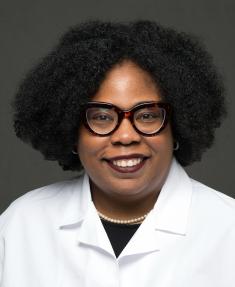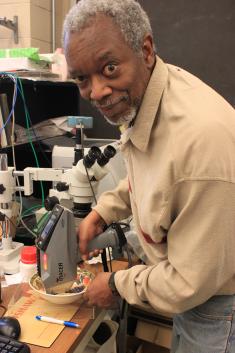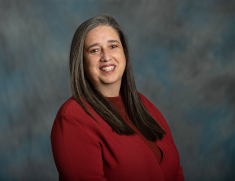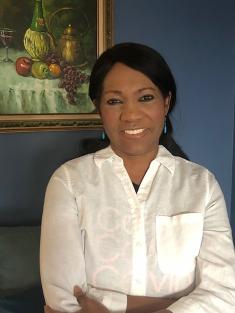Rutgers Office for Research Celebrates Black History Month

To celebrate Black History Month, the Office for Research is highlighting some of the many researchers from across Rutgers, The State University of New Jersey who are making an impact on the university and their field of study. The vital work being conducted represents the diversity of research within Rutgers, which is inclusive of STEM, arts, humanities and the social sciences. The faculty members featured in this Q&A story are not just leaders in their fields; they also represent the notions of diversity, equity, and inclusion that the university and the Office for Research strive to uphold.
Accordion Content
-

Valerie Fitzhugh, MD
Associate Professor and Chair, Department of Pathology, Immunology and Laboratory Medicine
Rutgers New Jersey Medical School (NJMS)
Rutgers Biomedical and Health Sciences (RBHS)OfR: What is the focus of your research and its potential impact?
Fitzhugh: I am one of the program directors of an exciting NIH funded R25 program, Multidisciplinary Summer Research Education Program for Health Professional Trainees (MORESHP); along with Drs. Pranela Rameshwar and Diego Fraidenraich from Rutgers New Jersey Medical School. We provide research opportunities to students who are underrepresented in the health professions, or who have been significantly financially disadvantaged, across all the RBHS schools with the goal of creating more clinical scientists across a number of backgrounds.My personal area of research interest is in bone and soft tissue tumors, with the hope of localizing genetic changes that may be beneficial to treating patients and better characterize tumors in the future.
OfR: What inspired you to focus on this particular area of research, and what inspires you now?
Fitzhugh: I am grateful that Dr. Rameshwar pulled me into the R25 project after the tragic passing of Dr. Nicholas Ponzio, one of my colleagues in the Department of Pathology, Immunology and Laboratory Medicine at NJMS; working with the students is a treasure and I am better for my interactions with them.In terms of bone and soft tissue tumor, I originally wanted to be an orthopedic oncologist; clearly this did not work out! However, in my work as a bone and soft tissue pathologist, and through my curiosity about these tumors, I am hoping to make a difference in the lives of these patients whose tumors are rare, and as a result, don't get as much attention as tumors that are more common.
OfR: What has your experience been like as a person of color working in your field of research?
Fitzhugh: I have often been called a unicorn; there are not many Black women who work in the field of bone and soft tissue tumor, either in research or in the research realm. I may be one of a very few Black women with a published Bone Pathology textbook. I hope this eventually changes in the future.OfR: What would your advice be to any student who wishes to pursue a career in your field of research?
Fitzhugh: Do it! We need you! There is such a need for people interested in bone and soft tissue research. Rare does not mean unnecessary. I am hoping that the foundations we are providing with the R25 program will encourage students to follow in our footsteps and build their own research!OfR: What more could be done to improve the diversity and inclusion within your field of research?
Fitzhugh: I believe programs like our NIH funded R25 program will be critical to diversifying translational research. Many of our students have continued their projects even after their time has ended with us. This continued engagement will be crucial to increasing diversity, equity, and inclusion efforts in research fields. -

Gene Hall, PhD
Professor, Chemistry and Chemical Biology
School of Arts and Sciences
Rutgers-New BrunswickOfR: What is the focus of your research and its potential impact?
Hall: My research has several main themes. First, I have been involved in lowering lead (Pb) exposure to New Jersey residents by analyzing drinking water. This project seeks to identify and eliminate Pb's source(s) in drinking water. In addition, my research has also been involved in determining the source(s) of Pb poisoning in children using the highly sensitive analytical method of inductively coupled plasma mass spectrometry (ICP-MS). Many of these children are children of color living in low-income housing notorious for containing Pb-based paint.A second project of significant interest is the characterization of prenatal omega-3 dietary supplements. This is important because many women are misled about the composition of these "fish oil" dietary supplements. Many of these misbranded dietary supplements do not contain "fish oil" but contain a synthetic product that produces ethanol as a metabolite. We are educating the public, so women get the proper sources of the important omega-3 fatty acid docosahexaenoic acid (DHA) during and after their pregnancies. DHA is an important nutrient in brain and eye development.
OfR: What inspired you to focus on this particular area of research, and what inspires you now?
Hall: My inspiration came from several reports that Pb can cause reduced I.Q. in children. Therefore, to prevent Pb exposure, you must develop analytical methods to identify the source(s) and then eliminate them. I continue to see the effects of Pb poisoning and the false advertising of prenatal omega-3 dietary supplements. This has made me more focused on these critical health challenges.OfR: What has your experience been like as a person of color working in your field of research?
Hall: My experience has been rewarding in that I can inspire other persons of color to pursue a career in analytical chemistry. Several times, students approached me and mentioned that they did not know I was a chemistry professor. I get the same comments when I give invited talks at national and international scientific meetings.OfR: What would your advice be to any student who wishes to pursue a career in your field of research?
Hall: Don't be discouraged when others try to steer you away from a career in chemistry because you may get comments like "you don't have what it takes," or you are "better off going into social work." Instead, I would recommend that students get involved in research as soon as possible and team up with someone who encourages and welcomes their input and contributions to the research team.OfR: What more could be done to improve the diversity and inclusion within your field of research?
Hall: There needs to be more visibility and recognition of the contributions that chemists of color have made to society. In addition, because the number of analytical chemists of color is very few, we need to be more promoting to make students aware of all the other scientific professions that use analytical chemistry to solve problems in other disciplines. -

Michelle Stephens, PhD
Executive Director, Institute for the Study of Global Racial Justice
Professor, English
Professor, Latino and Caribbean Studies
School of Arts and Sciences
Rutgers-New BrunswickOfR: What is the focus of your research and its potential impact?
Stephens: The focus of my research, in the broadest of terms, is the literature and culture of the African diaspora. More specifically, I explore the specific contributions of Caribbean intellectuals--artists, writers and thinkers—to the ways we think about race in the Americas, both specifically in the United States and in the Caribbean islands and territories. More recently I have turned to thinking and writing about how much meaning we have given to difference, racial difference and sexual difference, in the ways we think about what it means to be human. In addition to being a literary and cultural studies scholar I have also trained as a psychoanalyst, so most recently I have been publishing in the research sub-field of "race and psychoanalysis." My writing explores how racial thinking structures our minds and emotions. I have been able to see the impact of my prior training in helping psychoanalytic theorists, and clinicians, revise their model of the mind to include multiplicity and intersectionality as core aspects of a more plural notion of human subjectivity.OfR: What inspired you to focus on this particular area of research, and what inspires you now?
Stephens: When I moved from Jamaica to the United States to attend college, myself, my mother and my sister, all went through identity shifts in how we understood ourselves racially. We ended up in very different places, even though we shared very similar complexions. That was fascinating to me—what is race in America if three family members with similar complexions find themselves in different kinds of communities in the US and start defining themselves differently? Understanding how race, the ways each and every one of us thinks about ourselves racially—even those who are not thinking about themselves racially—became a fascinating topic for me from then on. And seeing how writers, visual artists, musicians, and other creatives are inspired by such questions as, what exactly is blackness? whiteness? even when those questions have led to traumatizing experiences--I have been so inspired in studying and trying to understand the meanings behind their works and how they answer those questions for themselves.OfR: What has your experience been like as a person of color working in your field of research?
Stephens: As a Caribbeanist and Black Studies scholar I have found a lot of community in this work, a way to think about questions that have defined me with like-minded people who may come up with similar or different kinds of answers. As a psychoanalyst I was surprised, and at first intimidated, in realizing that much of the psychoanalytic and mental health field had NOT thought about the way racial differentiation impacts how we treat people, interpersonally and clinically. Once past that shock, I am finding that I have something to say, and it is very rewarding to feel like I am being listened to and can have an impact helping others think about things they have not thought about before. It has broadened my perspective and made me more confident about my scholarly insights regarding racial formation in the Americas, which I am now bringing back to my African Diaspora studies research.OfR: What would your advice be to any student who wishes to pursue a career in your field of research?
Stephens: To not be afraid to invest in the life of the mind, to devote one's studies to understanding oneself and the world we live in, the history of how we have gotten to this moment, and the meaning we are making of our present. These are very challenging times for us all. If it is a passion, and undertaken seriously, I have found it rewarding to devote one's life to the scholarly study of the historical moment one lives in. Study in the arts and humanities can lead to profitable careers. I would encourage them to have faith in that.OfR: What more could be done to improve the diversity and inclusion within your field of research?
Stephens: We need to be thinking about the full pipeline—what messages are students receiving about studying in the arts and humanities more broadly, about studying race specifically, from their middle-school teachers? from their high school guidance counselors? For those students who still find themselves pursuing Black Studies in various humanities and social science fields in college, what prep programs exist to give them a sense of what getting a PhD in that field will look like for them? Who is mentoring them who can share a similar experience? That last question is a key one for us, here in the college environment. I really credit my colleagues in the University Committee on Diversity and Inclusion and in the Office of Equity ad Inclusion, Deepa Kumar and Anna Branch in particular, for foregrounding graduate and faculty mentorship as the crucial component for developing a diverse and inclusively excellent research community. -

Maxine Strickland, MPH, DMD
Associate Professor, Diagnostic Sciences, Division Oral Maxillofacial Radiology, School of Dental Medicine
Adjunct Assistant Professor, School of Public Health
Rutgers Biomedical and Health SciencesOfR: What is the focus of your research and its potential impact?
Strickland: My research focus concerns oral radiology, working with patients with disabilities, the various problems that interfere with respiratory function, pain and the oral environment. My work with patients with disabilities has been my inspiration to an invention, a novel toothbrush with evacuation capabilities, which would alleviate concerns over the common risks of aspiration and infection.OfR: What inspired you to focus on this particular area of research, and what inspires you now?
Strickland: I was inspired to work on this when I volunteered to be a consultant for Rutgers at a residential facility for the disabled to help with setting up a dental site for patients. There were many patients that were moderately to severely disabled; some were adults and quite a few patients were children, and it was wonderful to see them playing and enjoying themselves. Only sometimes I saw that that they would need special diets because they could not eat properly, food would go down the wrong way. It was so bad that some patients could not eat at all and needed a feeding tube.I was able to observe the pulmonologist as he determined which patients could and could not eat and needed diet modifications. This swallowing difficulty is what also made them at risk for aspiration pneumonia. When the clinic was established and ready, a full-time dentist was hired and I went back to Rutgers. I would, however, think of the patients at the center for the disabled. I started to draw out little diagrams of what I called a suction toothbrush – something that could remove the liquids from the mouth when they would brush at the same time. I remembered that some of the patients were prone to pneumonia since they had these swallowing problems. The idea of the suction toothbrush received the TechAdvance® award from the Office for Research as well as the National Science Foundation award, and two patents have been filed.
OfR: What has your experience been like as a person of color working in your field of research?
Strickland: As a person of color, I have found that the Office for Research and its technology transfer office Innovation Ventures has not made me see any differences in color. They are all amazing, honestly. I do have to wonder though about other companies that we have approached and how they see me; admittedly, the thought about color has crossed my mind. However, I would also say for the most part people have been really wonderful and for which I am very grateful.OfR: What would your advice be to any student who wishes to pursue a career in your field of research?
Strickland: My advice to any student who wishes to pursue a career in research is to go for it, and don’t let anything hold you back. I would also say that perseverance is the key. Perseverance must finish its work so that you are complete and lack nothing, James 1: 4 -5.OfR: What more could be done to improve the diversity and inclusion within your field of research?
Strickland: I believe if more people with a diverse background and of color are successful this would be an inspiration to others.



